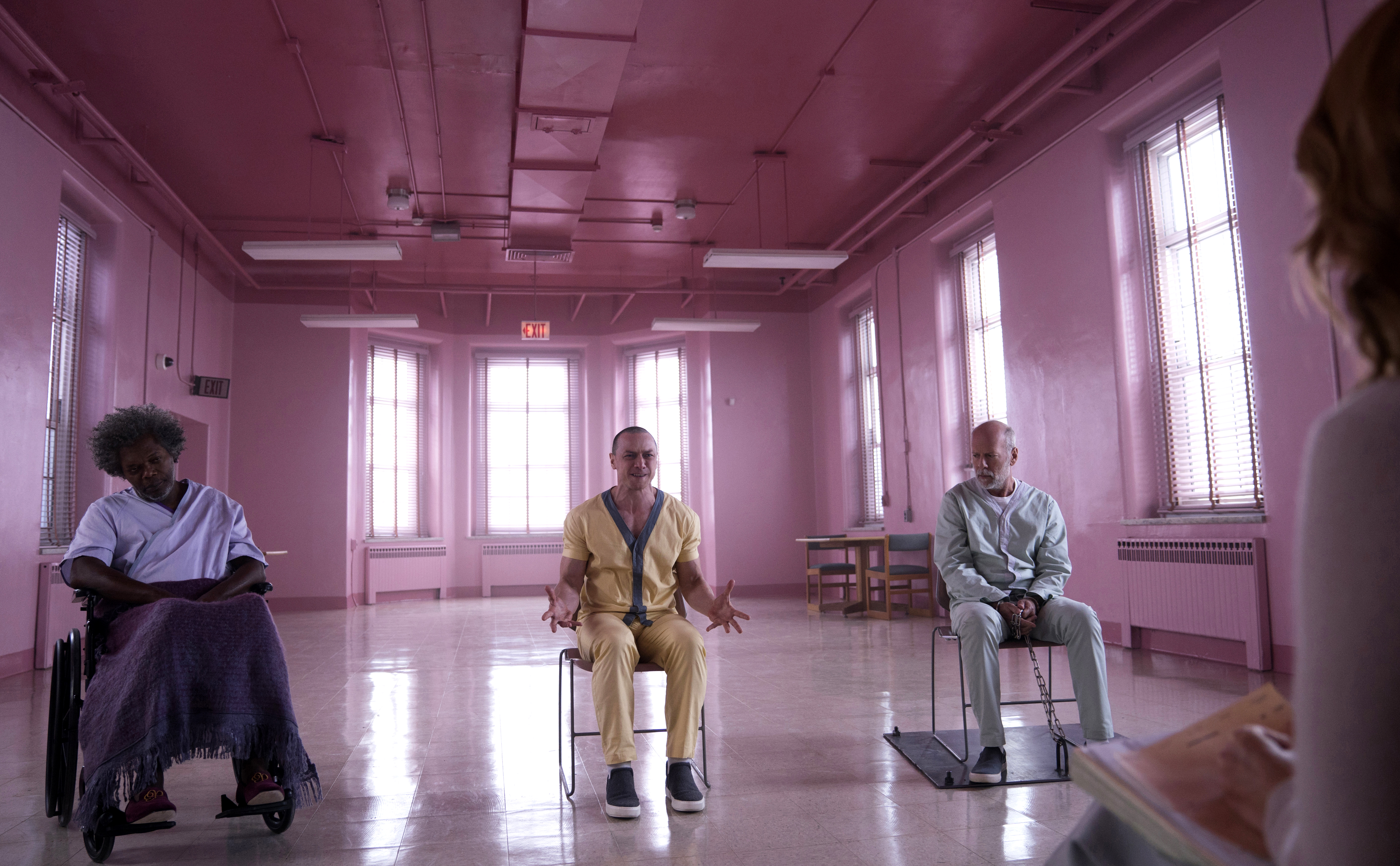M. Night Shyamalan's Glass is better than you've heard
Here's a twist: Glass is actually pretty good


A free daily email with the biggest news stories of the day – and the best features from TheWeek.com
You are now subscribed
Your newsletter sign-up was successful
M. Night Shyamalan's new superhero movie Glass is getting pummeled by critics. It's "one big anti-climax” (per The Associated Press), "stupefying and a little sad” (yikes, Time Out) and, most chilling, "the Life Itself of superhero movies” (ouch, IndieWire). It's hovering around a dismal 35 percent score on Rotten Tomatoes, not far off from some of the director's past blunders.
But here's a Shyamalan twist: Glass is actually pretty good.
Okay, okay — it is less surefooted than Shyamalan's best work. But this is in part because the movie has a lot of narrative weight to carry, being based both on Shyamalan's 2016 horror hit Split and — twist! — Unbreakable, a superhero picture he made nearly 20 years ago. Glass opens with Unbreakable's superman, David Dunn (Bruce Willis), on the trail of Split's Horde (James McAvoy), a disturbed man possessed by one of his many personalities, a man-beast with superhuman physicality. Eventually both men wind up in a mental hospital alongside an apparently catatonic Mr. Glass (Samuel L. Jackson), David's brittle-boned, comics-obsessed, self-styled nemesis. A therapist (Sarah Paulson), has just a few days to "cure" them of their supposed delusions before David and the Horde are remanded into police custody. The movie follows their sessions, and also keeps tabs on Casey (Anya Taylor-Joy) and David's son Joseph (still played by Unbreakable's Spencer Treat Clark) as they react to the news that these men have been apprehended.
The Week
Escape your echo chamber. Get the facts behind the news, plus analysis from multiple perspectives.

Sign up for The Week's Free Newsletters
From our morning news briefing to a weekly Good News Newsletter, get the best of The Week delivered directly to your inbox.
From our morning news briefing to a weekly Good News Newsletter, get the best of The Week delivered directly to your inbox.
Casey and Joseph may seem extraneous, especially for fans who came to see a showdown between Willis, Jackson, and McAvoy (a surfeit of characters is one of the few things Glass has in common with a bigger superhero bash like Avengers: Infinity War). But their inclusion speaks to why Shyamalan remains such a compelling artist. In Glass, as in its predecessors, several non-superpowered characters are as important as the heroes and villains. Casey has been victimized by the Horde, but that doesn't erase her empathy for the suffering within the beast; Joseph clearly idolizes his father, but doesn't aspire to imitate him; he just wants to help him and provide a human voice of reason. Everyone in this movie is wounded in some way and searching for their place in the world. Shyamalan is great at bringing out the vulnerability in his actors: The stoic Willis will suddenly show uncertainty, and even McAvoy's persona-switching bravado (often darkly funny) can give way to a sense of hurt.
This doesn't mean the movie is the self-serious slog some viewers are describing. While Shyamalan betrays little interest in contemporary comic-book culture or the proliferation of superhero movies — a fact plenty of critics have taken issue with — he visualizes his material with the style of a good comic artist. Glass is not an action movie by any stretch, but when characters fight, Shyamalan doesn't shoot the conflicts to show off elaborate choreography or special effects. (Willis may not even be the one doing the fighting, some have sniffed, as if the actor has a long history of stunning on-screen fight scenes.) Often the director breaks the sequences down into clear, striking images that look more like traditional comic-book panels than any number of modern superhero spectaculars. One skirmish, for example, happens entirely in the background of the frame, with another character occupying the foreground, a major show of visual confidence. Elsewhere, his point-of-view shots and color coding recreate the close visual guidance that a good comic book provides its readers.
Of course, most of Shyamalan's movies look good. Fewer of them sound good. Yet Glass' sometimes-goofy philosophizing gives the movie a distinct point of view, binding the story together even as it must divvy up screentime. Glass may be overstuffed, but it rarely feels rushed, because Shyamalan's camera holds such a steady gaze, more interested in his characters' feelings than their physical grappling.
The movie even sets up a slam-bang climax before pointedly scaling it back down in a way that clearly tests the patience of some of his fans. But after years of climactic garbage-swirl superhero bombast, I found it refreshing, not disappointing. It's more disappointing to see a movie both this odd and this elegantly shot being dismissed as dull.
A free daily email with the biggest news stories of the day – and the best features from TheWeek.com
Glass isn't as beguilingly melancholic or original as Unbreakable — and given recent genre peaks like Black Panther, Wonder Woman, and Spider-Man: Into the Spider-Verse, Shyamalan has arguably fallen behind the superhero-movie curve he once had beat. But true to his movie's philosophizing, he's done so by staying true to his idiosyncrasies and abilities. With its many characters alternately showcased and neglected, Glass is a strange movie. In its haunted, haunting way, it's also a satisfying one.
Jesse Hassenger's film and culture criticism has appeared in The Onion's A.V. Club, Brooklyn Magazine, and Men's Journal online, among others. He lives in Brooklyn, where he also writes fiction, edits textbooks, and helps run SportsAlcohol.com, a pop culture blog and podcast.
-
 The year’s ‘it’ vegetable is a versatile, economical wonder
The year’s ‘it’ vegetable is a versatile, economical wonderthe week recommends How to think about thinking about cabbage
-
 Moltbook: The AI-only social network
Moltbook: The AI-only social networkFeature Bots interact on Moltbook like humans use Reddit
-
 Judge orders Washington slavery exhibit restored
Judge orders Washington slavery exhibit restoredSpeed Read The Trump administration took down displays about slavery at the President’s House Site in Philadelphia
-
 Walter Isaacson's 'Elon Musk' can 'scarcely contain its subject'
Walter Isaacson's 'Elon Musk' can 'scarcely contain its subject'The latest biography on the elusive tech mogul is causing a stir among critics
-
 Welcome to the new TheWeek.com!
Welcome to the new TheWeek.com!The Explainer Please allow us to reintroduce ourselves
-
 The Oscars finale was a heartless disaster
The Oscars finale was a heartless disasterThe Explainer A calculated attempt at emotional manipulation goes very wrong
-
 Most awkward awards show ever?
Most awkward awards show ever?The Explainer The best, worst, and most shocking moments from a chaotic Golden Globes
-
 The possible silver lining to the Warner Bros. deal
The possible silver lining to the Warner Bros. dealThe Explainer Could what's terrible for theaters be good for creators?
-
 Jeffrey Wright is the new 'narrator voice'
Jeffrey Wright is the new 'narrator voice'The Explainer Move over, Sam Elliott and Morgan Freeman
-
 This week's literary events are the biggest award shows of 2020
This week's literary events are the biggest award shows of 2020feature So long, Oscar. Hello, Booker.
-
 What She Dies Tomorrow can teach us about our unshakable obsession with mortality
What She Dies Tomorrow can teach us about our unshakable obsession with mortalityThe Explainer This film isn't about the pandemic. But it can help viewers confront their fears about death.
